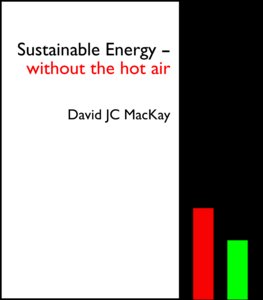
By Hamish Johnston
Are you feeling environmentally smug because you don’t leave your mobile-phone charger plugged in all the time?
Well I’m afraid that the physicist David MacKay wants to knock the wind out of your micro-turbine.
He says that this act of greenness is pointless because it only cuts your daily consumption of energy by less than 0.01%. That, by the way, is enough energy to run a car for about one second.
“But every little counts”, you may be thinking. That’s true, but in his book Sustainable Energy — without the hot air , the Cambridge professor argues that folks should focus on making meaningful changes like turning the thermostat down or improving their home insulation. Indeed, he managed to cut his heating gas consumption by a factor of four by doing so.
“Obsessively switching off the phone-charger is like bailing out the Titanic with a teaspoon”, he quips.
And what about roof-top micro-turbines? “An utter waste of resources”, he says. Indeed, a typical micro-turbine would, on average, generate enough electricity to power four idle phone chargers — bailing out the Titanic with a tablespoon. However, the Sun is strong enough in the UK for heating water and a roof-top system could supply about half a family’s hot water needs, he says.
MacKay was on BBC Radio 4 today explaining why we should pay more attention to exactly how much energy we consume and how that energy could be generated — in cold , hard units of kilowatt hours per day (a horrible unit, I know). You can listen to the interview here.
Also interviewed was Rebecca Willis of the UK government’s Sustainable Development Commission, who didn’t seem too impressed with MacKay’s book.
She seemed to be saying that turning sustainability into a technical debate “turns people off”.
The BBC’s Tim Harford — an economist by training — accused the Commission of promoting “style over substance” in its literature. For example, it recommends micro-turbines so that people can feel “connected” to electricity generation. After reading MacKay’s book, Harford said he felt “betrayed” by the Commission.
You can read MacKay’s entire book online here



